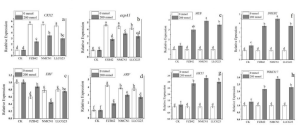A group from Key Laboratory of Integrated Management of Crop Diseases and Pests, Department of Plant Pathology, Nanjing Agricultural University, China, etc. has reported that halophilic Bacillus strains to enhance plant growth and reduced the adverse effect of saline stress on wheat through regulation of salt resistant genes
https://www.ncbi.nlm.nih.gov/pmc/articles/PMC9608499/
Salinity has a detrimental effect on wheat growth by inducing physiological and metabolic disorders that lead to oxidative stress, osmotic stress, nutritional abnormalities, membrane dysfunction, reduced photosynthetic activity and improper hormone function. Plants under salt stress often overproduce reactive oxygen species (ROS), i.e., superoxide (O2−) and hydrogen peroxide (H2O2) leads to protein, cell wall and nucleic acid damage. The aim of this study was to evaluate the potential of Bacillus strains isolated from the Qinghai–Tibet region of China to enhance plant growth and reduce the adverse effect of saline stress on wheat.
The selected Bacillus strains as PGPR, FZB42, NMCN1, and LLCG23, were able to grow on up to 10% NaCl, 18% NaCl, and 14% NaCl LB medium, respectively.
The inoculation of NMCN1 and LLCG23 significantly enhanced wheat growth parameters in terms of physiological traits, i.e., fresh weight 31.2% and 29.7%, dry weight 28.6% and 27.3%, shoot length 34.2% and 31.3% and root length 32.4% and 30.2%, respectively, as compared to control plants under high NaCl concentration (200 mmol).
It was found that salt-resistant genes in bacteria, DegU, OstB, OhrR, ComA, SodA, and OpuAC, were all up-regulated under saline conditions. And further, the plants inoculated with NMCN1 under salt stress (200 mmol NaCl) significantly overexpressed the genes in wheat related to expansin (expA1), cytokinin (CKX2) and auxin (ARF), followed LLCG23 and FZB42. The expression of ethylene encoding gene (ERF) was noticed to be highly downregulated in wheat plants treated with NMCN1 strain grown under the same stress condition. The wheat plants treated with highly halophilic bacteria, NMCN1, were noticed to highly express the salt-resistant genes (MYB, DREB2, HKT1 and WRKY17), followed by LLCG23 and FZB42, as shown below.
